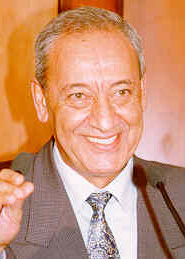Nabih berri was born on January 28, 1938 into
a Shi'i Muslim family living in Freetown, Sierra Leone. IN the 1940's
his family moves back to Lebanon, and settles in the town Tibnin in southern
Lebanon. He continued his secondary education in Makassed and Ecole de
la Sagesse, in Beirut. Mr. Berri graduated from the Lebanese University
with a degree in Law, and got his masters degree from the "Faculte
de Droit" in Paris. He started his career as a lawyer in 1963, was
also president of Lebanese Students Movement as well as Lebanese Universities
Union. Despite his political ambitions, Berri was sidelined by the traditional
Shi'ite establishment, headed by then-parliament speaker Kamel al-Asa'ad,
who refused to let Berri run on his electoral list in the 1968 and 1972
elections. Berri developed an acute hatred of Asa'ad that would reemerge
during the war. In the early 1970's, Berri worked as a lawyer for General
Motors (in Beirut). Berri lived in Detroit from 1976-1978 along with his
first wife. Berri also served as Attorney for Musa al-Sadr's Amal movement
during the 1970's. After Sadr's disappearance in 1978 while on a trip
to Libya, he returned to Lebanon to stake his claim for leadership of
Amal. After Hussein al-Husseini's brief tenure as leader of Amal, Berri
took over in April 1980. Between 1979 and 1982, the Amal movement was
involved in fierce fighting with the PLO groups.
In 1982 June: Berri urges Shi'i militia into strong opposition against
the Israeli occupation of southern Lebanon. In May 1983, President Amin
Gemayel strikes a peace treaty with Israel, something Berri strongly opposes.
In February 1986, Berri calls out to Muslim troops in the Lebanese army
to defy president Gemayel. This was a reaction to Gemayel's order of razing
Shi'i quarters of Beirut. Berri's manifestation of power had as the result
that Gemayel now started to deal with Berri directly on Shi'i questions.
i's quest to join the political establishment received a boost on February
6, 1984, when his militia participated in driving the Lebanese army out
of West Beirut.
ater that year, Berri was appointed Minister of State for the Rebuilding
of South Lebanon. He was later appointed Minister of Justice, Electrical
and Hydraulic resources.
In the mid-1980's Damascus relied heavily on Berri to counter the remilitarization
of Palestinian refugee camps by Arafat's Fatah movement. In May 1985,
Amal fought a two-year bloody war with the pro-Arafat Palestinian camps
in Beirut and south Lebanon, indiscriminately killing thousands of people.
In September 1985, Berri and two other pro-Assad militia leaders (Walid
Jumblatt and Elie Hobeiqa) signed the Syrian-brokered Tripartite agreement
that contained lengthy and detailed provisions calling for "complete
and firm coordination" between Syria and Lebanon on "all issues--Arab,
regional, and international." The Lebanese Army was to be "rehabilitated
with Syrian assistance" and instilled with the capability of "distinguishing
the real enemy from the real friend." The public outcry among Lebanese
Christians (and the equally fierce, if less public, opposition of Sunni
Muslims) led President Gemayel to reject the accord.
Berri's increasingly autocratic tendencies and subservience to Damascus
led to a dramatic decline in support for Amal within the Shi'ite community.
Hasan Hashim, a charismatic, popular figure who served as Berri's deputy,
resigned in 1986 to protest his "undemocratic" behavior. Top
military commanders such as Mustafa al-Dirani, Aql Hamiyyah, and Zakariyya
Hamza also abandoned the militia. Meanwhile, the rival Shi'ite Hezbollah
militia proved to be more adept than Berri in recruiting new members.
The net result was to make Berri even more dependent upon the Syrian regime.
In fact, fearing for his own safety following skirmishes with other groups,
Berri left the country and took refuge in Damascus.
In early 1987, Berri made a stupendous blunder by ordering his militia
forces into action against Druze and other pro-PLO militia forces entrenched
in West Beirut. The tide quickly turned against him. Within five days,
the headquarters of Amal in the Murr Tower were overrun, the PSP captured
the Hamra district, and two detachments of Amal militiamen were cut off
and surrounded. On February 22, 1987, Syrian forces stormed into West
Beirut to prevent Amal's complete defeat, closely followed by Berri, who
had spent nine months in exile in the Syrian capital. Berri soon turned
his attention to Hezbollah, which over the course of the next several
months proceeded to drive Amal forces out of several positions in the
southwestern suburbs of Beirut. Again, Syria intervened to save its militia
proxy, calling on both sides to withdraw from the contested areas. Hezbollah,
which had lost twenty-three fighters in clashes with Syrian forces in
West Beirut earlier in the year, wisely complied with the order and Syrian
forces occupied the area.
In the late 1980's, Berri supported the efforts of Syria to oust the constitutional
government headed by Interim Prime Minister Michel Aoun. Berri endorsed
Syria against Aoun despite the strong support that Aoun enjoyed in the
Shi'ite community. In 1992, Berri is elected Speaker of the parliament.
Nabih
Berri,
born 1938
